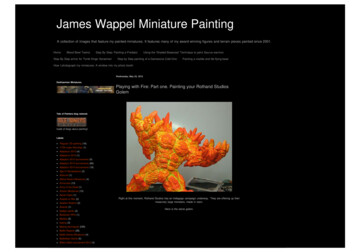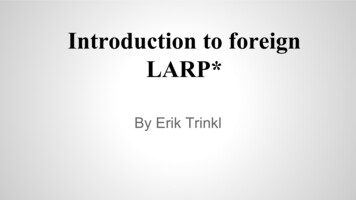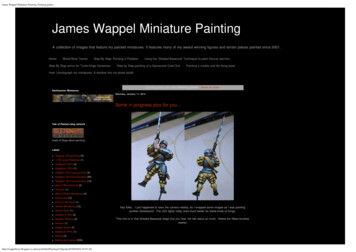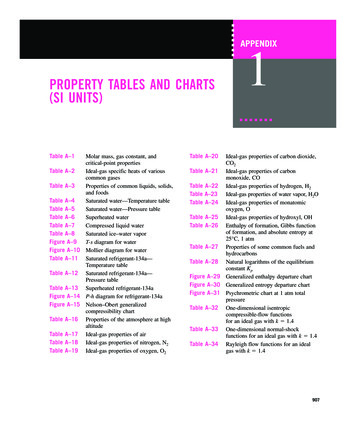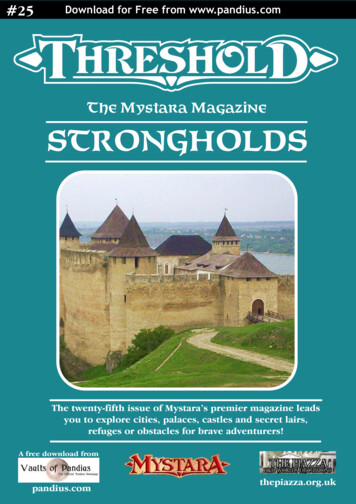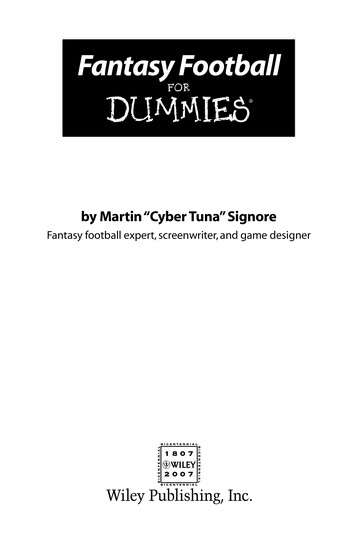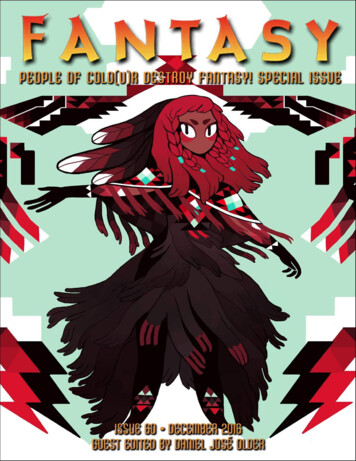
Transcription
TABLE OF CONTENTSIssue 60, December 2016People of Colo(u)r Destroy Fantasy! Special IssueFROM THE EDITORSPrefaceWendy N. WagnerPeople of Colo(u)r Editorial RoundtablePOC Destroy Fantasy! EditorsORIGINAL SHORT FICTIONedited by Daniel José OlderBlack, Their RegaliaDarcie Little Badger(illustrated by Emily Osborne)The Rock in the WaterThoraiya DyerThe Things My Mother Left MeP. Djèlí Clark(illustrated by Reimena Yee)Red Dirt WitchN.K. JemisinREPRINT SHORT FICTIONselected by Amal El-MohtarEyes of Carven EmeraldShweta NarayangezhizhwazhLeanne Betasamosake Simpson(illustrated by Ana Bracic)
WalkdogSofia SamatarName CallingCeleste Rita BakerNONFICTIONedited by Tobias S. BuckellLearning to Dream in ColorJustina IrelandGive Us Back Our Fucking GodsIbi ZoboiSaving FantasyKaren LordWe Are More Than Our SkinJohn ChuCrying WolfChinelo OnwualuYou Forgot to Invite the SoucouyantBrandon O’BrienStill We WriteErin RobertsArtists’ GalleryReimena Yee, Emily Osborne, Ana BracicAUTHOR SPOTLIGHTSedited by Arley SorgDarcie Little BadgerThoraiya DyerP. Djèlí ClarkN.K. JemisinShweta NarayanLeanne Betasamosake SimpsonSofia Samatar
Celeste Rita BakerMISCELLANYSubscriptions & EbooksSpecial Issue Staff 2016 Fantasy MagazineCover by Emily OsborneEbook Design by John Joseph Adamswww.fantasy-magazine.com
FROM THE EDITORS
PrefaceWendy N. Wagner 187 wordsWelcome to issue sixty of Fantasy Magazine!As some of you may know, Fantasy Magazine ran from 2005 until December 2011, atwhich point it merged with her sister magazine, Lightspeed. Once a science fiction-onlymarket, since the merger, Lightspeed has been bringing the world four science fictionstories and four fantasy shorts every month.This is Fantasy’s third installment of the Destroy series: People of Colo(u)r DestroyFantasy! After the success of our previous Women Destroy and Queers Destroy projects(for more information about the Destroy projects, please visit DestroySF.com), we havenow put the focus on POC creators, and have published People of Colo(u)r DestroyScience Fiction!—an all-SF special issue of Lightspeed—and People of Colo(u)rDestroy Horror! (Nightmare Magazine’s contribution to the party). Now it’s Fantasy’sturn to host the destruction.This very special issue features four original short stories, selected and edited byGuest Editor Daniel José Older; four reprints, selected by Amal El-Mohtar; seven essaysand interviews collected by Tobias S. Buckell; a selection of author spotlights; and, ofcourse, original art by a mix of exciting fantasy illustrators.It is an honor and a delight to bring Fantasy Magazine to you in this celebration ofPOC creators writing, editing, and illustrating fantasy short fiction. Thank you forreading!—Wendy N. Wagner,Managing Editor
People of Colo(u)r Editorial RoundtableDaniel José Older, Amal El-Mohtar, Tobias S. Buckell 1,600 wordsDanielI wanted to start with the idea of the origin story. Every writer has one, and it’s alwaysinteresting to hear how writers of color navigated the choppy waters of reading fantasyearly on and then deciding to write it. I remember searching for myself, in thatlanguageless sort of way we do when we’re young and don’t know the larger meaning ofour search. And I remember loving fantasy with all my heart even though I wasn’t there,and then feeling a kind of betrayal when I became more conscious and realized howdevastating that lack was, that erasure; it was a similar feeling to finally studying UShistory in depth and coming to understand the true horror of it. All those myths they raisedus with have their source in such dirty water. So for me, writing fantasy became an act ofreclamation. If it could be used to justify our destruction, it could also do the opposite,no? I put fantasy away for a long time and didn’t come back ’til I started reading Pullmanand Rowling, who both make motions at dealing with power and its complexities evenwhile still playing into very dominant narratives of whiteness. Then I was reminded ofOctavia Butler and something like a cannon went off inside me. I read everything shewrote—an English teacher, Mrs. Middleton, had given me Blood Child when I was in theseventh grade, so it was a return home for me—and then I read Díaz and Mosley and Iphysically HAD to write. It wasn’t a choice.TobiasI grew up in the Caribbean and there was a very strong tradition around me of oral folktales, tall tales, and duppy stories (ghost stories). Paul Keens-Douglas on the radio wasdoing stories in dialect, and he was the first person I realized was a full-time storyteller.Because the Caribbean nations were producing stories and culture centered around theirexperience, I had stronger models to look to in those spaces. Yet even so, I engaged withscience fiction and fantasy with a great deal of naïveté as a child. The far-off placesseemed exotic to a poor kid living on a boat in the islands. I didn’t twig to the singlenarrative I was consuming for a long time, particularly as my education in the VirginIslands at private schools began to emphasize British and American stalwarts thatreinforced the western narratives inside the SF/F I was reading. It was actually a piece ofscience fiction by an American that I read in high school that gave me my scales droppingfrom the eyes moment. I read an SF novel set in Grenada, and while it wasn’t perfect, Iread it so voraciously I felt like I’d been dying of thirst in the desert. It suddenly beggedthe question: why didn’t the Caribbean, India, South America, or Asia show up in thebooks I was reading in a meaningful (non-touristy) way? There was so little work that hadthis missing element that I realized if I wanted more of it, I needed to work at putting it out
there myself.DanielAh, that hunger is so real, Tobias. That’s exactly it. I wonder then about the momentwhen we go from readers to writers. I had always known writing was in me, stories camevery naturally. But I drifted in and out of knowing what that meant long-term/career-wise.I don’t think writing seemed like a real thing that someone could do in their life until Iread Stephen King’s On Writing that same magical year when I read Butler and Díaz. It’ssuch a practical, straight to the point manual—I don’t think I’d ever read anyone being soreal about the writing life before. Other books get very airy and pretentious about it all.This was flesh and blood. Even just reading his process around word counts and thesimple truth that if you keep putting down words, eventually you’ll have a finishedmanuscript, and then you have to figure out how to make it good. I was also blogging outthe weird adventures I had as a paramedic on NYC ambulances, and it was so simple: Iwould just come home and write out what happened the night before, took twenty minutesand came out cool. I thought, look—If I just make something up, throw some ghosts ormonsters in there, it’ll be fiction. And just like that a huge wall collapsed—the idea that Ihad to write THE GREAT NOVEL, SOMETHING PROFOUND ANDHEARTWRENCHING, which was really holding me back as it turned out, and my mottobecame, “Just tell the fucking story.” Which has very much kept me going over these yearsof being a writer.AmalI trace so much of my origins as a thinking, writing, speaking person to my childhoodin Lebanon. Some of my earliest memories are of being out of place: born in Canada,feeling the Arabic I was growing up with ceding place to English and French; moving toLebanon when I was six, already half-formed in language, my mother being told that Ispeak Arabic “like a foreigner” and struggling to find a school in which I could speak mywhole self; then back to Canada, my French now too posh for Quebec, my signifiersaskew, and learning all of a sudden the several ways in which I was Other.I could look at that history and shape any number of stories from it: say that the self Icobbled together was fragmentary, and that’s why I’m drawn to stories told in pieces; saythat growing up multilingual made me want to know all the names for all the things, andthat poetry, mythography, folk, and fairy tales offered an achievable path to that; say thatbeing colonized by at least two languages with warring, debatable borders made me wantto build bridges between them. But origin stories are always myths, and myths are alwaysteaching tools that can be worn down by their purpose until they’re smooth, round stones.For me, I went from being a reader to a writer when I was seven and wrote a poem tothe moon full of the Thees and Thous I’d absorbed from a children’s digest of A
Midsummer Night’s Dream. My parents told me that my grandfather—a revolutionarywho’d spent years imprisoned for his politics—had been a poet, and that I had hisfootsteps to follow in if that was what I wanted. I did, with all the fierceness of a childutterly convinced she already understands the world completely. Since then, poetry andfantasy have been my languages more than English, French, or Arabic, and small wonder:if (to slightly mangle T.S. Eliot) poetry can force, or dislocate if necessary, language intoits meaning, then fantasy does the same for reality: forces, or dislocates if necessary,reality into its truth.I’m glad to be taking part in a project where we can do the same, in turn, to Fantasyitself—break new truths out of old ground.TobiasOh, this, so very much this. I look white to most people, and I lived among a sort ofex-pat community on boats up and down the Caribbean. But most of my family and friendswere often Caribbean on the islands. Where did I belong? My mother was white, myfather black. As a toddler I still remember putting a pick in my hair and then crying whenit wouldn’t stay in my hair like my dad, it would just sadly slide out and fall to the floor. Iwas so frustrated. I bounced from group to group but always felt other.When I moved to the US, I felt even more at a loss.DanielIt’s wild to read these, because so much of the grounding for my imaginary work alsocomes from that sense of neither here-nor-thereness, being mixed, at home in many worldsand somehow none, an inbetweener. For a while, of course, I thought I was all alone inthat, then, as Baldwin says, I picked up a book. But the emotional experience of othernessand inbetweenness isn’t so well dealt with in fantasy lit; at least it wasn’t when I wascoming up, so while books provided a certain solace on one hand, it really took meetingand talking to other folks to find out that all these things I was feeling weren’t my burdento bear alone. So writing became a way of filling that void, answering that persistent call,the endless questions—both in myself and in fantasy.My favorite thing to hear about my own work from folks is that it feels like home. Ithink that’s the deepest of honors, to be able to reach that place in someone else that’s trueand indescribably safe, even if it’s amidst scary stories about monsters and haints. Thatdeeper safety, the kind that means we are recognized, seen.What we’re witnessing now is a kind of literary renaissance of the imagination. Allthese glorious counternarratives keep rising up from the rusted exoskeletons of failedhierarchies. And they are responses, yes, but also something brand new. New languages,new rhythms, new structures.What a time to be alive; what a time to be a writer.
ABOUT THE EDITORSDaniel José Older, Guest Editor-in-Chief and Original Fiction EditorDaniel José Older is the New York Times bestselling author of Salsa Nocturna and the Bone Street Rumba urbanfantasy series from Penguin’s Roc Books. He is also the author of the young adult novel Shadowshaper (Scholastic,2015), a New York Times Notable Book of 2015, which won the International Latino Book Award and was shortlisted forthe Kirkus Prize in Young Readers’ Literature, the Andre Norton Award, the Locus, the Mythopoeic Award, and namedone of Esquire’s 80 Books Every Person Should Read. You can find his thoughts on writing, read dispatches from hisdecade-long career as an NYC paramedic, and hear his music at danieljoseolder.net, on YouTube and @djolder onTwitter.Amal El-Mohtar, Reprints EditorAmal El-Mohtar is an author, editor, and critic: her short fiction has received the Locus Award, and she has twicebeen a finalist for the Nebula Award, while her poetry has won the Rhysling Award three times. She is the author of TheHoney Month, a collection of poetry and prose written to the taste of twenty-eight different kinds of honey,and acontributor to NPR Books and the LA Times. Her fiction has appeared most recently in Lightspeed, UncannyMagazine, and Ann VanderMeer’s Bestiary anthology, and as well as The Starlit Wood, an anthology of original fairytales edited by Navah Wolfe and Dominik Parisien. She divides her time and heart between Ottawa and Glasgow. Findher online at amalelmohtar.com, or on Twitter @tithenai.Tobias Buckell, Nonfiction EditorTobias S. Buckell is a New York Times bestselling author born in the Caribbean. He grew up in Grenada and spenttime in the British and US Virgin Islands, which influence much of his work. His novels and over fifty stories have beentranslated into eighteen different languages. His work has been nominated for awards like the Hugo, Nebula,Prometheus, and the John W. Campbell Award for Best New Science Fiction Author. He currently lives in Bluffton, Ohiowith his wife, twin daughters, and a pair of dogs. He can be found online at TobiasBuckell.com.
ORIGINAL SHORT FICTIONedited by Daniel José Older
Black, Their RegaliaDarcie Little Badger 4,100 wordsOutside, the quarantine train was unblemished white. Where its tracks skirtedpopulated regions, barbed wire and warning signs—DANGER! ¡PELIGRO!INFECTIOUS MATERIALS! ¡SUSTANCIAS INFECCIOSAS!—discouraged trespassersfrom marking the cars with spray paint.The interior was another story. In her cabin, a narrow sleeper with four beds (one forScreaming Moraine, one for Fiddler Kristi, one for Drummer Tulli, and one for theircarry-on luggage, several densely packed grocery bags, and an electric violin), Tullifound graffiti scrawled near her upper bunk.Amber Smythe was hereI LOVE JON HUYNHKallie Brett Austin Klark August 17-18FOR A GOOD TIME, CALL THE CDCgod help usTulli fished a leather-piercing needle from her sewing kit. With marks like spider silk,she etched: The Apparently Siblings rode the White Train
Tulli, Moraine, and Kristi were only siblings in the spiritual way; their band name wasa response to all the strangers who asked, “Are you triplets?”When she felt thorny—so almost always—Kristi responded, “Because Natives lookalike? No. Well. We might have the same great-uncle. He gotta reputation.”“Hey! Tulli! Are you defacing the train?” Moraine shouted, as if she couldn’t hear himacross three feet of recirculated air. “Don’t write our names! I’d rather not pay a fine.”“Uh oh. I wrote our band name already.”“Don’t worry,” Kristi said. “There’s no chance anybody will recognize it.”So the Apparently Sibs weren’t remotely famous, but they’d been off to a promisingstart before the plague spread. On average, they played four paid shows a month and hadsixty followers on Twitter (sixty-three, if you counted their mothers). With enough time,they could have serenaded the right person, signed a contract, and toured the world. Or, atthe very least, toured states outside Texas.Now, their on-stage corpse paint seemed like a premonition. What little humankindknew about the Big Plague pointed to a grim, albeit sluggish, prognosis. The poor soulswho carried the strain had a year, more or less. Could be enough time to find a cure.Maybe even enough time to mobilize the largest treatment plan in human history.Unfortunately, some people crashed fast, their nervous systems torn apart.A rap on the door announced breakfast: oatmeal and tea. The twenty-something,freckled nurse, Jon—is he the Jon of wall graffiti fame, Tulli wondered—prepared thefood with automaton efficiency and took their temperatures. Ninety-nine, ninety-eight, onehundred and one point nine. Kristi was running a vigorous fever already.“Can we do anything to slow her symptoms?” Tulli asked. Like all White Train nurses,Jon was a carrier, immune to the virus but contagious. Lucky: a hazmat suit would obscurethe sympathetic crinkles around his eyes.“Possibly,” he said. “The doctors at Mariposa Compound will do everything theycan.” Jon dropped the disposable thermometer tips down a biohazard chute near the door.He hesitated in the exit, gazing beyond Tulli’s head, as if distracted by a memory.“Goodbye, then,” he said. “Call if you need anything.”During breakfast, Tulli and Moraine hovered over Kristi, prepared to steady tremblinghands as she drank lukewarm black tea. Full-body shakes were a late-stage plaguesymptom, but they begin with subtle tremors, and Kristi shivered when she choked downthe dregs in her cup.“It’s just chilly,” Moraine said, wrapping a black Pendleton blanket around Kristi’sshoulders. “We need sunlight. Open the curtains.”“Good idea.” Tulli obliged, revealing the yellow desert. There were mountains in thedistance and barrel cacti in the foreground. Nearby, a bird’s tattered, desiccated corpsehung from a coil of barbed wire. “You should both have a nap,” she suggested. “Terriblescenery.”
The Apparently Siblings first met during the Maria de Soto University Pow Wow andCake Walk for Charity. As poor college freshmen, they were enticed by the one hundreddollar “best student intertribal dancer” prize, not community togetherness or actualdancing, pinkie swear. Tulli had to scour the boxes in her dorm room to find her neglecteddancing regalia: turkey feather fan, knee-high doeskin boots, and thirty-pound jingle dress.It had been years since her last pow wow, and the dress clutched her hips and arms,uncomfortably tight. Do it for money, she thought. And maybe you’ll win a free cake, too.German chocolate would taste so good right now.That year, the MdSUPWCWC, normally held on the soccer field, was moved to theindoor gymnasium in defiance of sparking, mountainous clouds overhead. The drum groupsat in the center circle of the basketball court. They were surrounded by the dancing ringand crowded benches for participants.Tulli noticed Moraine on the bench next to hers. Under the vibrant red fringe andsunset-colored beadwork that covered his grass dancer regalia, he resembled somebodyin her music composition class, the kid who always answered Dr. Brumford’s rhetoricalquestions.“Are you a music student at de Soto?” she asked.“Yeah!” He lowered his Navajo taco to shake her hand. “I’m Moraine, like the glacialdeposit. That’s a well-crafted jingle dress.”“Thanks. My mom made it.”“Blue suits you.”“Maybe, but I wanted black and orange. Halloween colors. Mom hates the holiday.”“Mine does, too! She thinks focusing on death and gloomy junk attracts evil.”“My mom says I have ghost sickness.”“What?”“A mental shroud, a preoccupation with death, a fearful obsession that manifests asphysical illness and psychic anguish. So basically I’m haunted because my favorite movieis Ringu.”Moraine laughed.“What if it’s real, though?” Tulli asked.“You believe in the supernatural?”Tulli shrugged. “I’m skeptical, but Moms have been right before.”“Let’s test it. My throat hurts, and you’re wearing a jingle dress.”“Okay?”“Jingle dancing is supposed to heal people, right?”“Maybe. It healed at least one person. Like a hundred and fifty years ago. Reputedly.An Ojibwe girl, I think? Dunno, man.” Jingle dresses, draped with hollow silver cones,clang with every leap. Tulli loved their rhythm, that’s all. She knew zilch about the originof the dance, its significance. Not like they taught that in public school.“Try to heal me,” Moraine insisted. “I want to believe.”A young woman—fancy shawl dancer, her regalia cluttered with shades of yellow and
pink—stepped between Tulli and Moraine. “First,” she said, “ghosts are real. They looklike shadows, and your jingle dress test doesn’t prove anything. Actually, it’s borderlineoffensive, so don’t let respectable people hear you. Second: I think you’re both in mymusic composition class. Hey. I’m—”“Kristi,” Moraine said. “Yeah, I know! Great to officially meet you!”They spent the pow wow arguing about ghosts—Moraine insisted that the shadowyfigures Kristi saw at night were symptoms of sleep paralysis, Kristi thought he was justscared of the unfathomable truth, and Tulli remained noncommittal. However, they didn’tannoy each other too much, so friendship inevitably blossomed.None of them won the competition. That prize went to a hoop dancer math major.Five years later, Tulli truly loved her buddies. She couldn’t envision better people tolive with. To die with.Hopefully, the death part would take its sweet time. The White Train’s mechanical heartbeat, a low whir that sounded nothing like thechug, chug, chug in movies, was punctuated by Tulli’s fingers drumming on thewindowsill and her steel-toed boots tapping the vinyl floor. They were nearing theMojave Desert, where several compounds, including Mariposa, treated high-threatcontagious citizens away from the lucky uninfected.Kristi’s reflection appeared in the glass, her wide eyes transposed over the cloudlesssky. The Pendleton fell in a heap at her feet.“Sorry, Hon,” Tulli said, turning. “Did my drumming disturb you?”“My dream . . .” Kristi pointed to a silhouette that cut the white-blue sky with long,sharp wings. “She was in my dream.”“That’s just a turkey vulture. Strange. I didn’t know they lived here. Don’t quote me onthat before I Google it, though. Go back to—”“She sent them. They’re her children, vultures. Eating . . . eating sick, old meat. Tohelp make the world clean.”“What? Whose children?”“The Plague Eater.” With a sleepwalker’s drowsy gait, Kristi stumbled back to bed,pulling the cotton sheet up to her chin and murmuring something about dancing. Tullitucked the Pendleton over her friend.“What?” Moraine asked, waking. “Did Kristi have a nightmare? Must be exciting. I’dlove to experience her brain for just one REM cycle.”“Nightmares aren’t pleasant, last I checked.”“Better than the tedious junk I experience. This time, I dreamed of notes in the majorkey.”“You’re a true musician, Moraine.”“Guess I’ll try again.” He pulled the sheets up to his chin. “Hey.”
“Yeah?”“Keep an eye on her, okay?”“I promise.”Once her friends drifted off to sleep, Tulli sat on the end of Kristi’s bunk and held herhand. The muscles in her long fingers—a violinist’s fingers, spidery and dexterous—tensed, relaxed, and tensed. Her livelihood, if not her life, was rapidly expiring.Where were the powers their mothers swore by? The great forces that heal faithfulchildren and make bodies strong? “I’ll do anything,” Tulli whispered. “You just need toask.”In the silence that followed, she chuckled. The Apparently Siblings reveled in gallowshumor. It was much nicer than weeping.Later, as the train chugged through Mariposa Compound, it passed rows of whitebarracks with slatted pitch roofs. Laundry lines, sun-bleached plastic toys, and pottedplants cluttered the residential grounds. The train stopped between sprawling, nearlyidentical facilities. To the right: a hospital. To the left: a community center. Beyond themwere convenience shops, the kindergarten to twelfth-grade school, a computer lab, alibrary, and a cafeteria. Tulli had memorized her compound map during the trip, knewwhere every facility was located. Where she and her siblings would live. Where theywould be treated. Where they could eat, rehearse, and hang out. Where they would bememorialized, if the plague consumed them.Nurse Jon helped load their bags on a trolley. “I have to ask something,” he said. “Areyou three related?”“Because we look alike?” Kristi asked.“Excuse me, Miss. I don’t meet many goths.”“You’re my new favorite person, Jon,” Tulli said. “Our style is closer to neoclassicalalt-metal fusion than goth.”“Here’s why I asked,” Jon said. “They house men and women separately in MariposaCompound unless you’re family or dating.”Moraine shook his head. “I see,” he said. “We have the same great-uncle. Will that do?I can’t convincingly pretend to date a woman.”“Hopefully. Good luck, you three.” Jon escorted them outside, stealing a breath offresh air before ducking back into the White Train.Thanks to their apocryphal great-uncle, the Apparently Siblings shared a bedroom thatwas originally designed for one patient. Imperceptibly tinier than their efficiencyapartment in McAllen, the close quarters did not bother Tulli. At least they had a window.Granted, it overlooked a blank white wall, one of the neighboring barracks.“The internet broke again,” Kristi said, prodding her laptop. She’d been bedridden forthree days, shivering under her covers and racing to finish her memoirs before the illnessmade typing impossible. “I’m supposed to call my parents in twenty minutes.”“There’s a landline in the common area,” Moraine said.“I want to see them.”
Tulli peered out the window, her back to the other siblings. During sunset, the blankwall resembled a cool flame: vivid orange, blushing darker, slipping into shadow.“How’s your family doing?” she asked.“Still healthy, but worry will kill ’em before any virus, at this rate,” Kristi said.Orange became rust, red, black. Tulli rapped a shrill toy drum she borrowed from theK to 12 music room. Pacing, Moraine hummed the tune he dreamed on the White Train.Kristi finished her memoirs with a discontented sigh. At nightfall, they all climbed intobed. Breakfast ended at nine sharp, and the meal lines got longer every day. “What’s theopposite of a vampire?” Moraine asked. “‘Cause I feel like one. It’s unnatural, this earlyto-bed schedule.”Tulli pretended to be asleep. If she responded, Moraine would chatter well into latenight-early-morning. The last time that happened, they overslept and missed bothbreakfast and lunch. She could hear Kristi shifting, shuddering, contorting under thePendleton blanket with whispering shif, shif, shifs. Plague-triggered muscle spasms: mostpeople called them slow death throes. It was like a dance, a terrible dance.In the hypnagogic realm between awake and asleep, where dreams poisoned reality, ashadow stood proudly against the wall. It possessed eyes: unblinking, round, yellow eyeswith pupils that swallowed Tulli’s soul, two points of space-time singularity from whichnothing could escape.Drumbeats rang—rap, RAP, rap—and the shadow began to spin. It revolvedclockwise around the walls, and when the circle was completed, a final, thunderous raprang out, punctuated by the sound of breaking glass.Tulli leapt to her feet; the window near her bed had cracked. Cautiously, she peekedoutside. “Whoa!” A wake of turkey vultures stumbled drunkenly below the window,stunned by their impacts against the glass. One by one, they alighted, until all thatremained were three tail feathers piled in the dust.“Hyuh!” Moraine said, patting his pillow-ruffled punk pompadour. “I just had theworst case of sleep paralysis.”Kristi, wrapped in black wool, said, “It was a dancing ghost. Unless you believe inshared hallucinations?”“What about shared visions?” Tulli asked. “Guys. This may be our jingle dancemoment. I think we’ve been chosen.”“By whom?” Moraine said.“No idea. Hold your imperious retort while I grab those feathers.”As Tulli entered the alley, she heard a radio muttering through a neighbor’s crackedwindow. The static-thickened voice said, “I looked, and behold, an ashen horse; and hewho sat on it had the name Death.” Tulli was not religious, but, as a fan of horror moviesand the novel Good Omens by Neil Gaiman and Terry Pratchett, she knew all about thefour horsepeople of the Apocalypse, color- and noun-themed riders who emerged duringthe End Times.The moon was full and high, its light spilling into the alley between barracks. When
the radio preacher concluded, “. . . to kill with sword and with famine and withpestilence and by the wild beasts of the earth,” Tulli pressed the turkey vulture feathersover her eyes, blocking the obnoxious white globe. They were so dark, Tulli wondered iftheir vanes devoured more light than the blackest material on Earth, a forest of carbonnanotubes constructed by Japanese scientists, her personal STEM heroes.“Not today, Apocalypse,” she said.Inside, Moraine and Kristi were fussing. Nostalgia washed over Tulli; she thoughtabout the day they met. How little things changed, even when everything changed.“The virus causes hallucinations when it damages the temporal lobe,” Moraine said.“Shadows are common.”“We all saw a woman spinning around our bedroom as turkey vultures smackedrhythmically into the window.”“Okay. Sure. What makes you believe she was teaching us a special dance?”“Powerful dances come from visions. That’s what my mother taught me. That’s whather mother taught her. That’s how I know what I know.”“Don’t take this the wrong way: if your ancestors knew powerful dances, why aren’twe ruling the world right now?”“We’re holding our own,” Tulli interrupted.“And dying,” he said.“The whole world is dying. Seems like the perfect time for higher powers to reawake.You’re a singer. I’m a drummer. Kristi is a dancer . . . until her hands work again. We’regoing to respect the vision that danced across our wall tonight. What’s the worst thatcould happen?”“Nothing,” he said.“Nothing would be the very worst,” Kristi agreed.“Right. Nothing. Moraine, I’m scared of nothing right now.”He bit his lip, contemplative. “All right. Let’s get started, Ladies. Kristi needs regalia.What was the vision dancer wearing?”“A dress?” Kristi said. “And a shawl? It’s hard to tell. The whole thing was ashadow.”“A shadow . . .”They needed black fabric. Lots of it.The first flier the Apparently Siblings pinned to the community message board wasshort and informative:BLACK FABRIC NEEDED FOR A DANCE CEREMONY!Hόόyíí! Please consider donating used clothes, thread, buttons, etc. Acollection box is outside our door (Barrack 19, Room
course, original art by a mix of exciting fantasy illustrators. It is an honor and a delight to bring Fantasy Magazine to you in this celebration of POC creators writing, editing, and illustrating fantasy short fiction.

